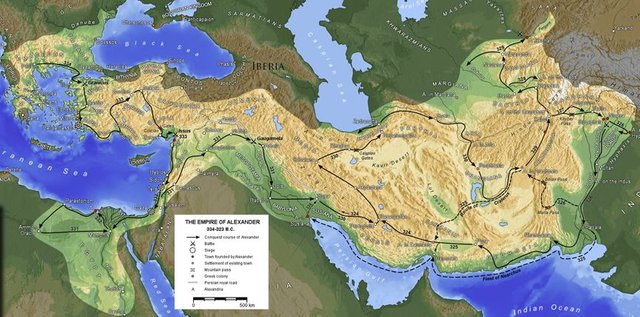Militarily, the Macedonians may have won an overwhelming victory at Issus, with many more to follow in the years to come. However, the legacy of the defeated lived on in the victors, who later built their own empires in Persian tradition on the ruins of Persia.
332-331 BC In the Land of the Pharaohs
Before the Macedon prepares for another collision with Darius, he moves to Egypt. The danger that the Persian uses the time to gather his strength is secondary. Alexander must first prevent the Persian-occupied country on the Nile falls his troops in the back. He conquers it without resistance, and the people welcome him as a liberator. In Memphis, Egyptians even crown him Pharaoh.
After he founded the city of Alexandria on the western, muddy branch of the Nile (about seventy cities of the same name are to follow in the next few years), he moves to the oasis of Siwah, where he consults the oracle of the Ammon god. What exactly he is experiencing there is not known, but probably the priests Alexander confirm his divine descent. The nimbus that surrounds him with this "honor" exaggerates him in the oriental world beyond human measure and facilitates many of his later successes. Impressed Alexander expresses the desire to be buried once in Siwah.
331-330 BC Persia's capitals fall
From Egypt, Alexander finally moves east. Darius, who has gathered a new army at Babylon, awaits him on 1 October 331 at Gaugamela in the plain of the Tigris. This battle will decide who will rule the Persian Empire in the future. The odds are good for Darius: Alexander has about 45,000 men under his command with foot troops and cavalry. Opposite this are up to 100,000 Persian warriors as well as additional chariots and war elephants.
But the Persian can not take his chance. Although his troops initially gain the upper hand, he lies, as Alexander comes dangerously close to him with his cavalry. With this he loses another battle, although the victory is within reach. Alexander does not pursue a persecution and instead moves to Babylon. In November he is handed over the city kampos, a month later he also takes the seat of government Susa. On the throne of the Achaemenid dynasty, he can now be oomiell as the successor of Darius honor. In Susa, Alexander also falls into the hands of the Persian treasury. The financing problems of his campaign are thus a thing of the past.

